A Look Inside The Usborne Lift-The-Flap Periodic Table Book. Language Skills in Science: Creating a Science video book on the Table of Elements #ESO2
Effective teaching and learning requires the development of the different language skills. The students are exposed either to written language (as in textbooks, handouts and other materials) or the spoken word (shared orally, for example during class presentations or discussions). Language is necessary even when doing practical work since teachers must explain what they are doing (productive skills) and students will need to understand (receptive skills) and ask questions (productive and mediation skills).
Introduction to literacy in Science
VOCABULARY WORK is essential in order to provide some scaffolding. Effective vocabulary learning strategies of the diverse learners of our school. In this case, specific vocabulary work is required in the Science Lesson and hence, it deserves a well designed Literacy Approach. This vocabulary we are mentioning here is vocabulary that comprises the science classroom language which falls into three broad categories: the technical, the non-technical vocabulary items and the use of everyday words to communicate and work the scientific knowledge through.
1. The former comprises technical words which are specific to science, for example: photosynthesis, respiration and genes in biology; force, matter and high voltage in physics; atoms, elements and protons in chemistry. Additionally, when used as science terms, every day words may attain new meanings and hence become "science words".
2. The latter comprises non-technical words and defines the particular language of learning and teaching in a classroom or the language of a science text. Some of these non-technical words give identity to certain science subjects where they are used to embody a particular concept important to a process of learning in the specific science subjects such as for example: “mixtures and compounds”, in chemistry, “diversity” in biology or “disintegrate” in physics.
3. Everyday words and connectors must be taken into consideration too, as well as contextualised in the scientific context.
A Look Inside The Usborne Lift-The-Flap Periodic Table Book
This case shows a sample of vocabulary work related to the Periodic Table of Elements in ESO2 (chemistry field). Additionally, we have also used this opportunity to introduce everyday vocabulary related to the core topic, using the periodic table to research about the real life of their elements. This work was carried out by means of a series of class presentations. You can read about the worked examples here.
Preparation task: Working on Pronunciation, intonation and rhythm
Task: Reading Out Loud (literacy approach) and Filming the Book Pages (IT skills)
MATERIALS USED























Comments
Post a Comment
Thanks for your comment!